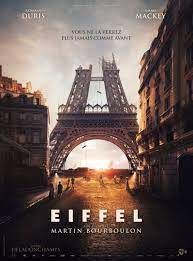
EIFFEL
France, 2021, 108 minutes, Colour.
Romain Duris, Emma Mackey, Pierre Deladonchamps, Armande Boulanger.
Directed by Martin Bourboulon.
There was a time when Paris was not dominated by the Eiffel Tower. This portrait of its engineer and builder, Gustave Eiffel, takes us back to that time, the 1880s. It is the story of the planning and the building of the Tower, but it also emphasises, almost equally, a romance story between Eiffel and the love of his life, Adrienne, 20 years earlier, how it was broken by her family, and her reappearance of the time of the building of the tower.
Romain Duris has become a significant figure in French cinema and fits the role of Eiffel perfectly. French actress, with British background, Emma Mackay, is a striking presence as his love, Adrienne. At this time, Eiffel was a widower with three children, constantly supported throughout his work by his eldest daughter, Claire.
The early part of the film establishes Eiffel’s credential as a civil engineer, a sequence at the dedication of The Statue of Liberty, the tribute to the French, Eiffel receiving an award from the American government. To further illustrate his credentials, there are flashbacks to his work as a bridge designer and builder in the 1860s, especially a bridge over the river Garonne, his working in metal, even writing a handbook on the topic.
With this established, a French government situation arises as to the choice of a significant landmark for the 1889 Universal Exhibition. Eiffel and his company win the commission and we see the workings of Eiffel’s mind, his imagination, working on a model of the tower, altering it, planning for it to go 300 feet above Paris. One of the advantages of the film is that there are quite a number of sequences, quite elaborate in detail, of the digging of the foundations, of the work of the artisans, of the building up of the metal base, the challenge to reach the first stage, Eiffel and his involvement, his financial assistant, public opinion beginning to move against the tower, protests and demonstrations, vilification is, political interventions.
And, in the meantime, Adrienne, the love of the past, now a married woman, arrives in Paris and meets Eiffel again. The meeting, the various occasions of encounter, regrets from the past, explanations of what it happened, the hostility of Adrienne’s husband, are all presented in the French romantic traditional style.
Which means then that this can be called a romantic portrait, romanticising, in some ways but deservedly, the ingenuity and skills of Eiffel, especially with the achievement of the tower, but also romantic in the love, self-sacrifice, humanity and passion of love and disappointment.
Tres francais.
- The status of the Eiffel tower? French monument? World Monument?
- Audience knowledge of Eiffel, the planning and building of the tower, its opening in 1889, visitors ever since?
- The 1880s, costumes and decor, visual style? Paris, homes, official offices, restaurants and city life, the site of the tower? The stages of building? The interlude with the Statue of Liberty? The flashbacks to the 1860s, the countryside, the town, homes, bridges and building sites? The river? The musical score?
- The portrait of Gustave Eiffel? Age, experience, engineering, the use of metal on bridges, his writing the book? His company, the achievement with the Statue of Liberty, the American award? His staff, his assistant, financial issues? The World Fair, the government and the ambitions for a striking monument? The various plans, designs of towers? Eiffel offhand, seeing the tower, wanting to compete, the details of seeing him change the design, the submission to the competition, his winning?
- Eiffel as a personality, strong minded, driven, his work on the tower, the continued plans, the site and its vastness, underground, the foundations, the danger from water on the river, laying the foundations, building up, the task of achieving the first level?
- Public opinion, praising him when he won the award and the commission, turning against him, the media, gossip? Demonstrations? His defiance, determination to build?
- Eiffel, the background of his marriage, his children, his daughter and her continued support?
- The details of Eiffel working at his desk, the design, changes? The detail of work on the site, audience immersed in the building and development, the difficulties? The workers, payment, financial difficulties, Eiffel and his assistant, talking to the men, the appeal, promises? The continuing the work?
- The flashbacks to 20 years earlier, the bridge, Eiffel young, the encounter with Adrienne, her parents, society, his falling in love, her teasing him, love, engagement? Her parents forbidding it? Wanting to marry someone else? Sending her away, the father condemning Eiffel?
- Adrian, 20 years, her marriage, her husband and his business interests, connection with Eiffel? Power? The return, the effect on Eiffel, tentative meetings, falling in love again, the relationship? The approval of his daughter? Adrienne, her character, defying her husband? The husband, conniving against Eiffel? The ultimatum? Adrienne leaving? The effect on I felt?
- The completion of the tower, the acclaim for Eiffel, Adrienne in the crowd?
- As a film, the combination of the achievement of the Eiffel Tower permeated with the romance story?